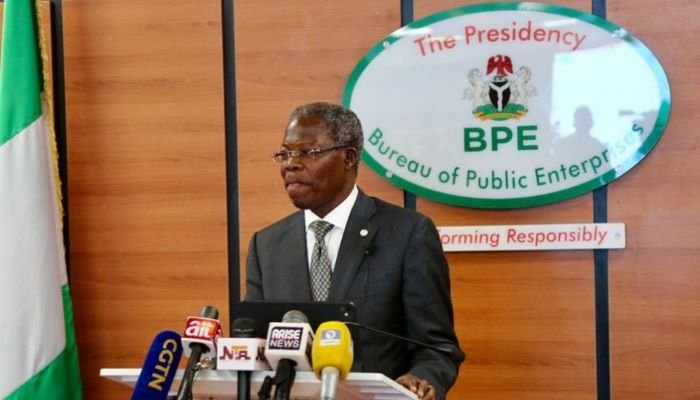THE Federal Government has unveiled plans to privatise 91 public enterprises in a renewed push to strengthen Nigeria’s economy, generate more revenue, and create jobs.
News Point Nigeria reports that the Director General of the Bureau of Public Enterprises (BPE), Mr. Ayodeji A. Gbeleyi, disclosed this during a media briefing in Abuja on Tuesday, stressing that the fresh wave of privatisation was aimed at ensuring optimal performance and repositioning key sectors of the economy.
Among those lined up, two Electricity Distribution Companies (DisCos) and one power generation company (GenCo) have been earmarked for Initial Public Offerings (IPOs) on the Nigerian Stock Exchange, although their identities remain confidential.
“At this stage, because of transaction confidentiality, we are not in a position to disclose two out of the 11 DisCos. We are also unable to disclose the GenCo that is the target for confidentiality and to avoid causing anxiety or concern, whether among labour, workers, or the wider society,” Gbeleyi explained.
The BPE boss noted that Nigeria’s electricity supply industry continues to face recurring bottlenecks. Although 23 power plants are connected to the national grid, as many as five could be out of operation at any given time due to gas shortages, vandalism, transmission limitations, and liquidity crises.
He further revealed that the planned privatisation of five GenCos has been put on hold, citing volatility in the foreign exchange market.
“When the transaction started in 2021, the official exchange rate was around N450. By last year, it was averaging N1,600, and today it stands at about N1,575. The fundamentals of the transaction changed along the line, but government is still keeping an eye on it,” he said.
Gbeleyi expressed disappointment that the GenCos had not fully embraced the Eligible Customer Regulation, pointing to weak transmission infrastructure as a major setback.
“If you produce power in Zungeru and need to sell it in Egbin, there must be transmission capability to deliver that power. Without the infrastructure, eligible customers cannot benefit,” he stressed.
Gbeleyi also outlined several reforms under the present administration. He said core investors of four DisCos remained intact while seven have been restructured.
The unbundling of the Transmission Company of Nigeria (TCN), he explained, gave birth to the Nigerian Independent System Operator (NISO), a body created to promote efficiency and market independence in the electricity sector.
On metering, the DG highlighted significant progress, with 6.47 million meters installed as of March 31, 2025, compared to just 403,255 in 2013. Out of this, 3.2 million meters were deployed under the $500 million Distribution Sector Recovery Program (DISREP), while 2.5 million meters came from the Presidential Metering Initiative.
Although the BPE has yet to disclose criteria for prospective shareholders, Gbeleyi said the privatisation programme will be transparent and carefully managed to avoid market disruption.
“The essence of this exercise is to reposition the enterprises for efficiency, create jobs, and strengthen the economy. Government cannot do it all; the private sector must play its role,” he said.
With 91 companies now listed for divestment and parts of the power sector set for stock market entry, Nigeria’s privatisation push may define a new chapter in its economic reform journey.







